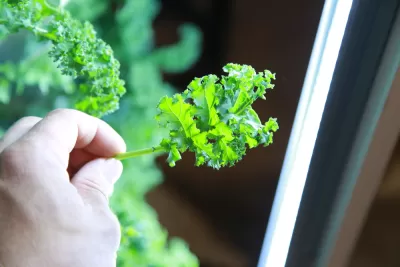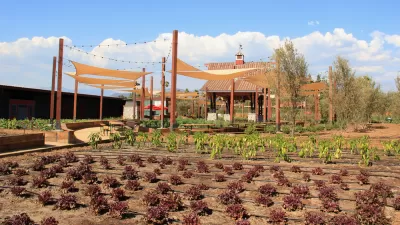Hydroponic indoor farmers hope to charge a premium for plants grown out of season in indoor farms. The notion has generated attention from big investors, but whether or not consumers will follow is an open question.

Is an indoor hydroponic farming boom coming? These farms use plenty of energy and make produce that is currently a lot more expensive than conventionally grown crops, but some think the appeal of out-of-season produce will be worth the cost. "Last year when San Francisco-based indoor farming startup Plenty, which grows a variety of salad and leafy greens hydroponically (without soil) and uses artificial lighting in facilities in three locations, announced that it had raised a whopping $200 million in funding from the SoftBank Vision Fund, whose investors include Amazon founder Jeff Bezos," Steve Holt writes for Civil Eats. These farms grow much more produce per acre than traditional farms.
"The astronomical capital costs associated with starting a large hydroponic farm (compared to field and greenhouse farming), its reliance on investor capital and yet-to-be-developed technology, and challenges around energy efficiency and environmental impact make vertical farming anything but a sure bet," Holt writes.
Another barrier to growth may be consumer perception of produce grown hydroponically. A University of Illinois study looked into the question. "They asked a panel of 117 participants a series of questions about their perceptions of and willingness to pay for lettuce grown in fields, greenhouses, and in vertical farms. While vertical farming ranked fairly high in terms of produce quality and safety, the tech-heavy production method was rated less 'natural' than both field farming and greenhouse and ranked last in participants’ willingness to purchase it," Holt reports.
FULL STORY: Can Vertical Farms Reap Their Harvest? It’s Anyone’s Bet.

Maui's Vacation Rental Debate Turns Ugly
Verbal attacks, misinformation campaigns and fistfights plague a high-stakes debate to convert thousands of vacation rentals into long-term housing.

Planetizen Federal Action Tracker
A weekly monitor of how Trump’s orders and actions are impacting planners and planning in America.

San Francisco Suspends Traffic Calming Amidst Record Deaths
Citing “a challenging fiscal landscape,” the city will cease the program on the heels of 42 traffic deaths, including 24 pedestrians.

Defunct Pittsburgh Power Plant to Become Residential Tower
A decommissioned steam heat plant will be redeveloped into almost 100 affordable housing units.

Trump Prompts Restructuring of Transportation Research Board in “Unprecedented Overreach”
The TRB has eliminated more than half of its committees including those focused on climate, equity, and cities.

Amtrak Rolls Out New Orleans to Alabama “Mardi Gras” Train
The new service will operate morning and evening departures between Mobile and New Orleans.
Urban Design for Planners 1: Software Tools
This six-course series explores essential urban design concepts using open source software and equips planners with the tools they need to participate fully in the urban design process.
Planning for Universal Design
Learn the tools for implementing Universal Design in planning regulations.
Heyer Gruel & Associates PA
JM Goldson LLC
Custer County Colorado
City of Camden Redevelopment Agency
City of Astoria
Transportation Research & Education Center (TREC) at Portland State University
Jefferson Parish Government
Camden Redevelopment Agency
City of Claremont



























